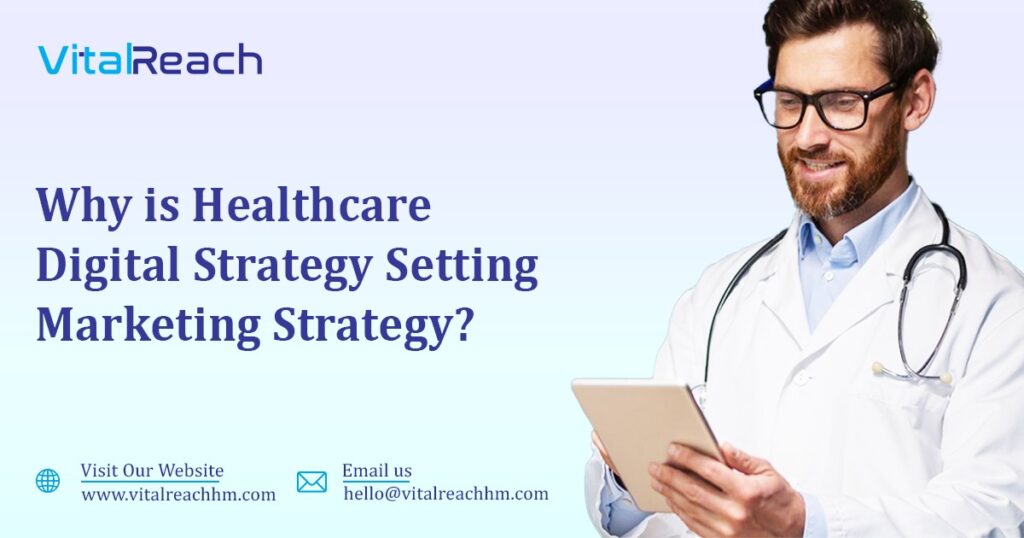In an era dominated by technology, the healthcare industry is undergoing a transformative shift towards digitalization. As healthcare providers strive to enhance patient engagement, improve outcomes, and stay competitive, the role of digital strategy has become integral to shaping effective marketing initiatives. This article explores the symbiotic relationship between healthcare digital strategy and marketing, highlighting the impact of these strategies on healthcare systems.

The Evolution of Healthcare Marketing Strategy
The Rise of Healthcare Digital Strategy
Traditionally, healthcare marketing relied heavily on conventional methods, such as print ads, direct mail, and television commercials. However, the digital revolution has ushered in a new era, where patients are increasingly turning to online platforms for health-related information. Healthcare providers, recognizing the need to adapt, have embraced digital strategies to connect with their audience more effectively.
The Convergence of Healthcare and Digital Marketing
- Integrated Digital Platforms (H3): The convergence of healthcare and digital marketing involves the seamless integration of various online platforms. From social media and search engines to healthcare-specific websites, providers leverage these channels to reach and engage their target audience.
- Patient-Centric Approach (H3): Digital strategies allow healthcare providers to adopt a patient-centric approach. Through personalized content, online portals, and interactive tools, patients can actively participate in their healthcare journey, fostering a sense of empowerment and loyalty.
- Data-Driven Decision-Making (H3): The digital landscape provides a wealth of data that healthcare marketers can harness. Analyzing patient behavior, preferences, and engagement metrics enables data-driven decision-making, ensuring that marketing efforts are targeted and effective.

The Impact of Healthcare Digital Marketing Strategy
Enhancing Patient Engagement
- Educational Content (H3): Digital platforms facilitate the dissemination of educational content. Healthcare providers can create informative blogs, videos, and interactive materials that empower patients with knowledge, driving engagement and promoting a healthier lifestyle.
- Social Media Interaction (H3): Social media platforms offer a direct line of communication between healthcare providers and their audience. Engaging content, health tips, and Q&A sessions create an interactive environment, fostering a sense of community and trust.
Building Brand Authority
- Online Reputation Management (H3): A strong online presence contributes to positive brand perception. Through patient testimonials, reviews, and expert content, healthcare providers can build and manage their online reputation, establishing authority and credibility.
- Thought Leadership (H3): Digital platforms provide a space for healthcare professionals to showcase their expertise. Thought leadership articles, webinars, and podcasts position providers as industry leaders, attracting patients seeking trusted and knowledgeable experts.
Improving Accessibility and Convenience
- Telehealth Services (H3): The integration of digital strategy in healthcare extends to telehealth services. Digital marketing helps promote and streamline the adoption of telehealth, making healthcare services more accessible and convenient for patients.
- Online Appointment Scheduling (H3): Digital strategies enable the implementation of online appointment scheduling systems. This convenience not only meets patient expectations but also optimizes healthcare provider schedules, reducing no-show rates and enhancing efficiency.
FAQs About the Impact of Marketing Strategies in Healthcare Systems
Q1: How does a healthcare digital marketing strategy contribute to patient trust?
A1: A healthcare digital marketing strategy builds trust by providing transparent and educational content, engaging patients through social media, and showcasing the expertise of healthcare professionals through thought leadership.
Q2: Can digital marketing improve patient outcomes in healthcare systems?
A2: Yes, digital marketing can improve patient outcomes by promoting health awareness, encouraging patient engagement, and facilitating the adoption of convenient healthcare services, such as telehealth and online appointment scheduling.
Q3: What role does data play in shaping healthcare marketing strategies?
A3: Data is crucial in shaping healthcare marketing strategies. It enables providers to understand patient behavior, preferences, and trends, allowing for targeted and effective marketing efforts that resonate with the audience.
Read More: https://vitalreachhm.com/do-digital-ads-work-in-healthcare-marketing
In conclusion, the symbiotic relationship between healthcare digital strategy and marketing is shaping the future of the industry. As providers continue to embrace digitalization, they not only enhance patient engagement, build brand authority, and improve accessibility but also contribute to the overall success and efficiency of healthcare systems. Embracing a holistic approach that integrates digital strategies into marketing initiatives is key to navigating the evolving landscape of healthcare in the digital age.

